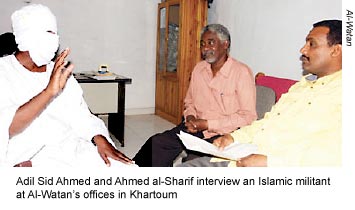New York, February 14, 2007—The Committee to Protect Journalists is deeply concerned by the recent detention of two Sudanese editors and the temporary closure of their newspaper after they interviewed religious militants last week.
At around midnight on February 7, a Sudanese security officer visited the home of Adil Sid Ahmed, deputy editor-in-chief of the Arabic-language daily Al-Watan, in the al-Sajana neighborhood in southern Khartoum and summoned him for questioning at a nearby security services office, local journalists told CPJ. Ahmed was then questioned for several hours by four security officers about an interview Al-Watan published that day with two masked men who visited the newspaper’s office on February 6 and threatened to kill foreigners in Sudan. Ahmed was then arrested and sent to Khartoum’s Kober jail, the sources said.
Two days later, on February 9, another editor at the paper, Ahmed al-Sharif, who was also present during the interview, was arrested by security officers in al-Jazirah state in the east-central region of Sudan and taken to Kober jail. Much like Ahmed, al-Sharif was questioned with regards the interview and asked if he knew any further information about the two masked men. The security officers accused both editors of withholding information about the identity and whereabouts of the Islamic militants, but the editors insisted that they published everything they knew.
“The detention of Adil Sid Ahmed and Ahmed al-Sharif and the closure of their paper is part of a troubling pattern of intimidation by the Sudanese authorities against the independent press,” CPJ Executive Director Joel Simon said. “We call on the state prosecutor to drop this case against both journalists, and for officials to cease their blatant harassment of journalists.”
On February 11, the security officers transferred both journalists to the state prosecutor’s office and accused them of sedition and breaching public peace under articles 63 and 69 of the 1991 Criminal Act respectively, as well as articles 27, 29, and 37 of the Sudanese Press and Printed Materials Act 2004 regarding violations of editorial and journalistic responsibility, CPJ sources said. Both editors were released before noon that day, a source at the paper told CPJ. The state prosecutor is considering whether or not to charge the journalists and refer their case for trial.
The day after the editors were released, the National Press Council, Sudan’s official press regulator, informed Al-Watan that it was imposing a two-day suspension of the paper even though the prosecution had not yet determined if the editors had committed a crime, Al-Watan reported. Al-Watan did not publish its issue on Tuesday pursuant to the order. The paper’s lawyer appealed on Monday and the court allowed the paper to resume publication on Wednesday while it considers the National Press Council’s ban.
The accusations against the editors stem from an interview the journalists conducted with two masked men claiming to represent Islamic groups that threatened U.S. and other foreign nationals in Sudan. In the surprise visit to the paper’s offices, one of the men stated that they “sent a warning to the U.S. embassy and the UN in Khartoum that we will oppose them militarily and will fight against foreign intervention.” The journalists asked the men questions such as “Where do you train?” and “Are you connected to Al-Qaeda?” and published the short interview in its entirety. The men said they were not Al-Qaeda, but supported that group’s goals. Religious extremists oppose foreign intervention to stop the conflict in the western region of Darfur.
Court cases and censorship have been on the rise in Sudan in recent months, including in February, December, October, and September.
